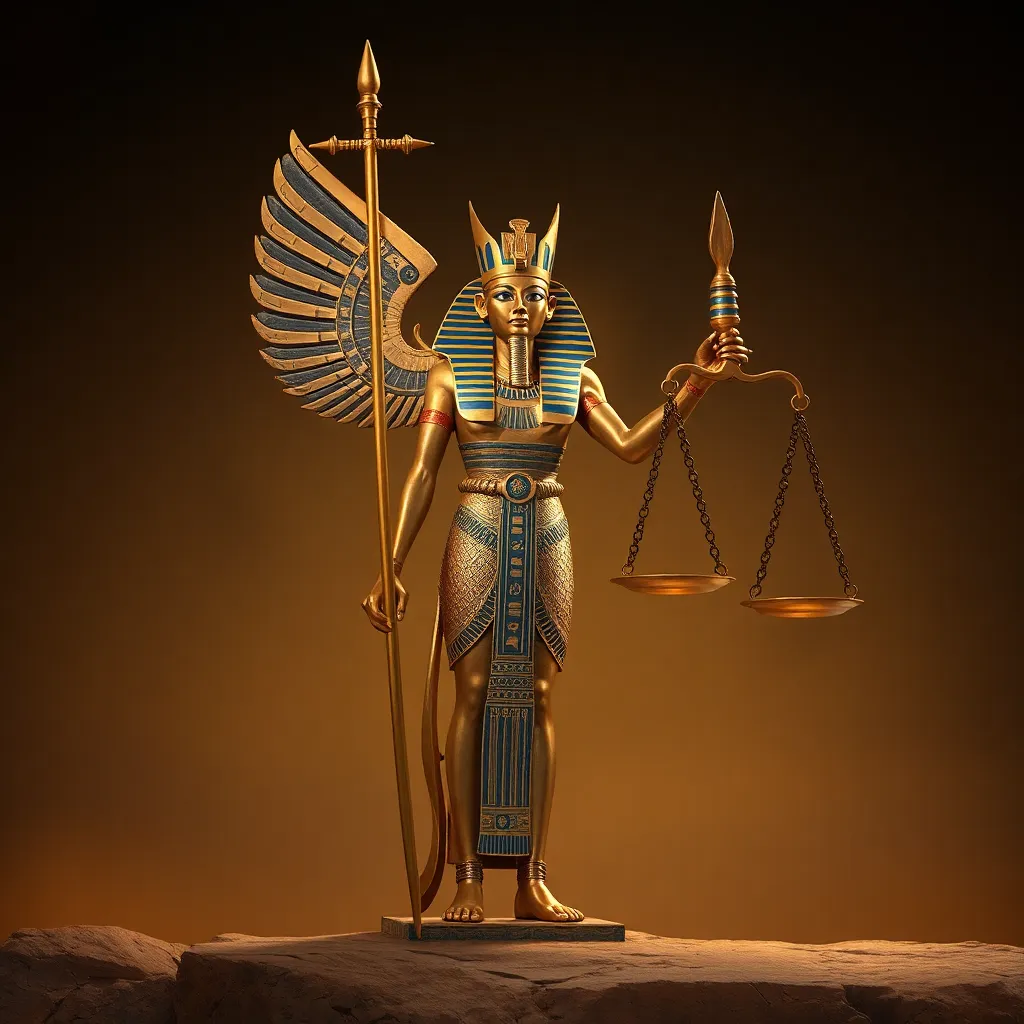The God of Justice: Ma’at’s Role in Maintaining Order and Harmony in the Universe and Her Influence on Ancient Egyptian Society
I. Introduction
Ma’at is a central figure in Ancient Egyptian mythology, embodying the principles of truth, justice, and cosmic order. She represents the essential balance required for harmony within the universe. In the context of Ancient Egyptian culture, justice, order, and harmony are not just abstract concepts; they are integral to the functioning of society and the cosmos. This article aims to explore the multifaceted role of Ma’at in ancient beliefs, her influence on society, and her lasting legacy.
II. The Concept of Ma’at in Ancient Egyptian Beliefs
A. Origins and Etymology of the Term “Ma’at”
The word “Ma’at” originates from the ancient Egyptian language, meaning “truth” or “order.” It signifies the natural order of the universe, encompassing everything from the laws of nature to human society.
B. Ma’at as a Goddess and Personification of Truth and Justice
Ma’at is often depicted as a woman with an ostrich feather on her head, symbolizing truth and balance. As a goddess, she personifies the ideals of justice and moral integrity, and her presence is vital for maintaining order.
C. Symbolism Associated with Ma’at
- Feather of Ma’at: A symbol of truth and justice.
- Scales: Used in the weighing of the heart ceremony to measure a soul’s worth.
- Heritage: Represented as a key figure in creation myths, embodying the order established by the gods.
III. Ma’at’s Role in the Cosmic Order
A. The Balance of Chaos and Order in the Universe
In Ancient Egyptian cosmology, the universe is a delicate balance between chaos (Isfet) and order (Ma’at). Ma’at’s role is to maintain this equilibrium, ensuring that chaos does not prevail.
B. Ma’at’s Influence in the Creation Myth
Ma’at played a crucial role in the Egyptian creation myth, where she helped establish order from chaos, laying the foundation for the world and all life within it.
C. The Significance of Ma’at in Daily Operations of the Universe
Ma’at’s principles govern everything from the movement of celestial bodies to the actions of human beings. Her influence is pervasive, reminding Egyptians of their responsibility to uphold truth and justice.
IV. Ma’at and the Afterlife
A. The Weighing of the Heart Ceremony
A key aspect of Ma’at’s influence is seen in the weighing of the heart ceremony, where the deceased’s heart is weighed against the feather of Ma’at. This ritual determined the fate of the soul in the afterlife.
B. Consequences of Living in Accordance with or Against Ma’at
Those who lived by Ma’at were rewarded with a peaceful afterlife, while those who acted against her principles faced dire consequences, often being consumed by the devourer god Ammit.
C. Ma’at’s Role in Ensuring Justice for the Deceased
Ma’at played a crucial role in ensuring that the deceased received justice, reinforcing the belief that moral integrity was essential for a favorable judgment in the afterlife.
V. Ma’at’s Influence on Ancient Egyptian Society and Governance
A. The Concept of Ma’at in Political Philosophy and Leadership
Ma’at was not only a cosmic principle but also a political philosophy. Leaders were expected to reflect her values, ensuring that their reign was just and equitable.
B. How Pharaohs Embodied Ma’at in Their Rule
Pharaohs were considered divine representatives of Ma’at on Earth. Their role was to uphold her principles, ensuring order and justice within the realm.
C. Laws and Societal Norms Influenced by the Principles of Ma’at
The legal system in Ancient Egypt was deeply influenced by Ma’at. Laws were framed within the context of justice and moral order, promoting societal harmony.
VI. Rituals and Practices Honoring Ma’at
A. Religious Ceremonies and Festivals Dedicated to Ma’at
Various ceremonies and festivals were held to honor Ma’at, celebrating her role in maintaining cosmic order and societal justice.
B. The Role of Priests and Priestesses in Maintaining Ma’at
Priests and priestesses of Ma’at played a critical role in performing rituals and ensuring that the principles of Ma’at were integrated into daily life and governance.
C. Art and Literature Reflecting Ma’at’s Values
Ma’at’s ideals are reflected in Ancient Egyptian art and literature, which often depicted her as a guiding force for truth and justice. Artwork featured her symbolism, reinforcing her significance in society.
VII. Ma’at’s Legacy and Influence Beyond Ancient Egypt
A. The Impact of Ma’at on Later Philosophies and Religions
The principles of Ma’at have influenced various philosophical and religious systems, highlighting the universal quest for justice and order.
B. Modern Interpretations of Ma’at in Justice and Ethical Systems
Today, Ma’at’s values resonate in modern discussions of justice and ethics, serving as a reminder of the importance of truth and balance in society.
C. The Relevance of Ma’at’s Principles in Contemporary Discussions on Social Justice
Ma’at’s ideals are increasingly relevant in contemporary social justice movements, emphasizing the need for equity, truth, and moral integrity in addressing societal issues.
VIII. Conclusion
Ma’at’s significance in maintaining order and harmony cannot be overstated. Her principles have shaped not only Ancient Egyptian society but continue to influence modern discussions on justice and ethics.
Reflecting on Ma’at’s enduring legacy encourages us to consider the importance of justice, balance, and moral integrity in our lives today, reminding us that the pursuit of these ideals is a timeless endeavor.




